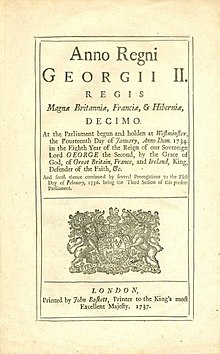| Act of Parliament | |
 | |
| Long title | An Act to explain and amend so much of an Act made in the Twelfth Year of the Reign of Queen Anne, intituled, "An Act for reducing the Laws relating to Rogues, Vagabonds, sturdy Beggars, and Vagrants, into One Act of Parliament; and for the more effectual punishing such Rogues, Vagabonds, sturdy Beggars, and Vagrants, and sending them whither they ought to be sent," as relates to common Players of Interludes. |
|---|---|
| Citation | 10 Geo. 2. c. 28 |
| Dates | |
| Royal assent | 21 June 1737 |
| Other legislation | |
| Amends | Vagrants Act 1713 |
| Repealed by | Theatres Act 1843 |
Status: Repealed | |
| Text of statute as originally enacted | |

The Licensing Act 1737 (10 Geo. 2. c. 28) is a former Act of Parliament in the Kingdom of Great Britain, and a pivotal moment in British theatrical history. Its purpose was to control and censor what was being said about the British government through theatre. The act was repealed by the Theatres Act 1843, which was itself replaced by the Theatres Act 1968. The Lord Chamberlain was the official censor and the office of Examiner of Plays was created under the Act. The Examiner assisted the Lord Chamberlain in the task of censoring all plays from 1737 to 1968. The Examiner read all plays which were to be publicly performed, produced a synopsis and recommended them for licence, consulting the Lord Chamberlain in cases of doubt. The act also created a legal distinction between categories of "legitimate theatre" and "illegitimate theatre".